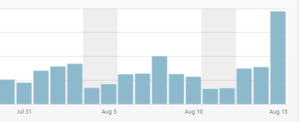Well, we are going into our fifth hour of EFS-Web and PAIR being broken at the USPTO. When a customer tries to get into EFS-Web, the very disappointing situation is that this message shows up on the USPTO web site:
EFS-Web and EFS-Web Contingency are unavailable.
The system status page on the USPTO web site says:
The USPTO is performing emergency maintenance on multiple systems which began at 12:01 a.m., Wednesday, August 15 and is expected to be completed by 5:30 a.m., Thursday, August 16 ET.
On a practical level this means that it may well turn out that it is impossible to get a same-day filing date at the USPTO for filing of new patent applications today.
Of course you can go down to the post office and file by means of Priority Mail Express. But then USPTO will ding you with a $400 penalty for failing to e-file.
This situation is unacceptable.
Keep in mind that if the thing that you need to do is filing a PCT application, you have about another hour and half during which you could file it at RO/IB. You don’t necessarily have to use RO/US as your way of filing a PCT application.
More than two years ago (on April 1, 2016) I explained (blog post) what USPTO did (or rather, should have done) to guard against this kind of failure. Unfortunately it seems that even now in 2018, USPTO permits all too many single points of failure that can lead to the main EFS-Web server and the contingency EFS-Web server to both be broken at the same time. It’s as though both e-filing servers were plugged into the same extension cord, and through a bit of bad luck somebody tripped over the extension cord and unplugged it.
Earlier today I dropped emails to several of the people at the USPTO who are in charge of these systems. One by one, each of these people sent me an automated “vacation” email. Here are some of the vacation messages:
- I am out of the office and will return 8/17.
- I am currently out of the office and will return on 8/20.
- I’m currently out of the office and will return on Thursday (8/23).
 As I reported to you on July 20, 2018 (blog article), the search fee paid in US dollars by US filers for a PCT search carried out by the EPO will drop on September 1, 2018.
As I reported to you on July 20, 2018 (blog article), the search fee paid in US dollars by US filers for a PCT search carried out by the EPO will drop on September 1, 2018.

